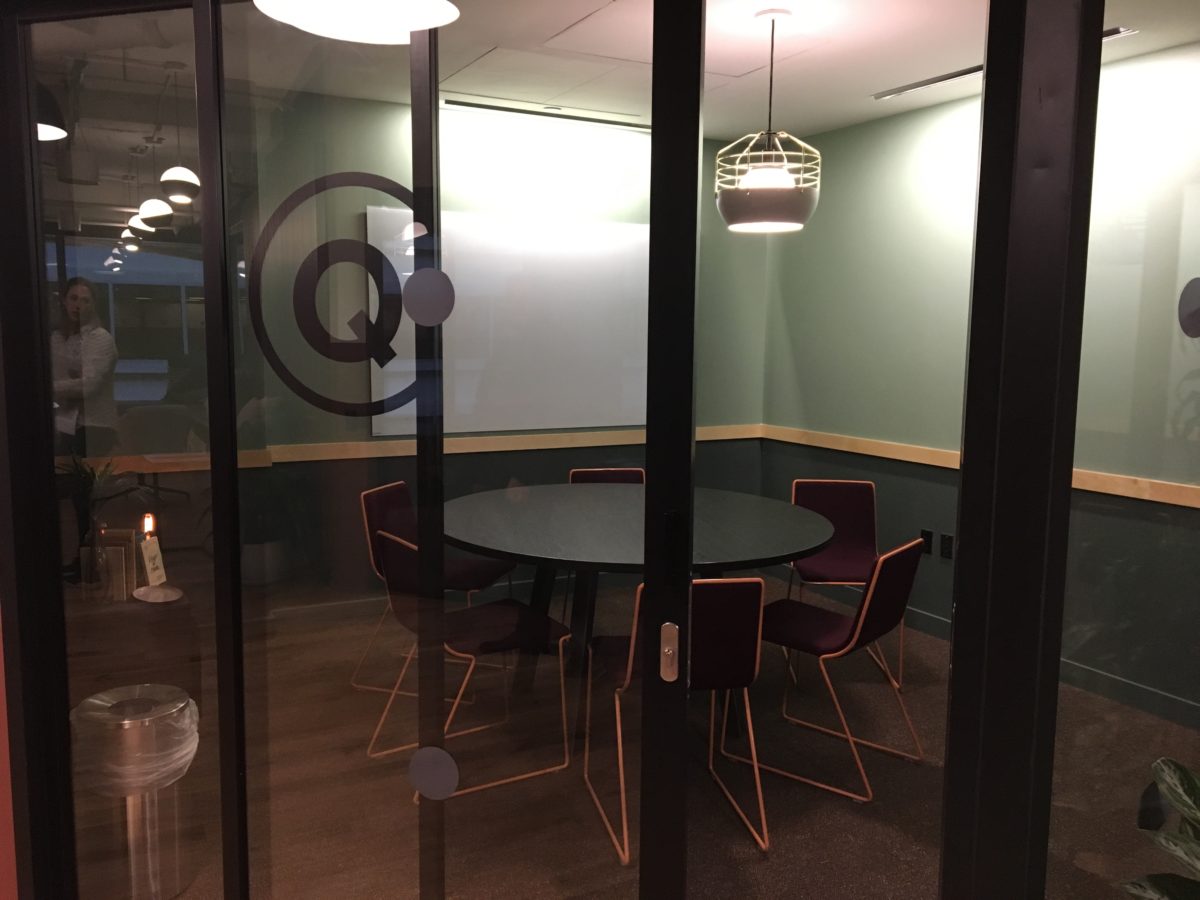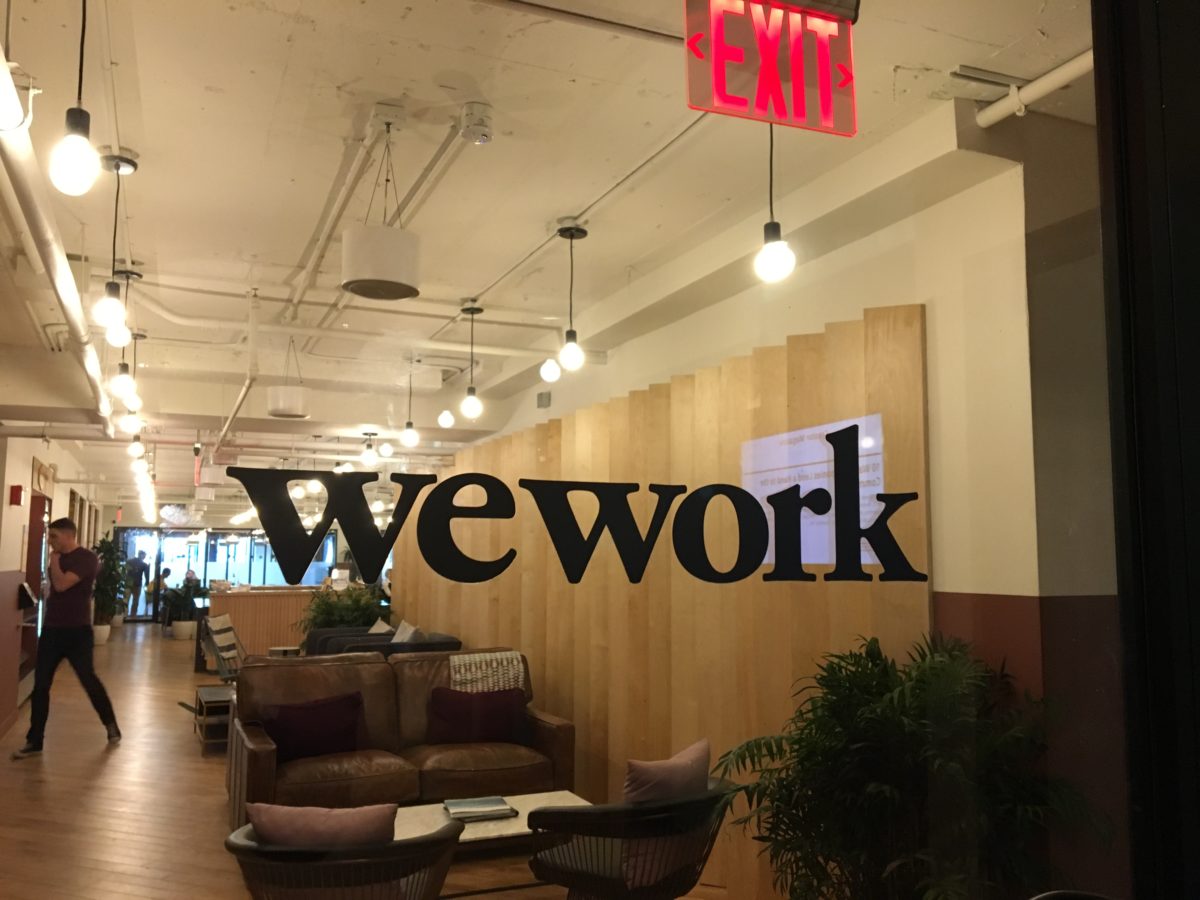At the beginning of the month, coworking giant WeWork opened its most recent space in the D.C. area — its seventh that’s currently in operation — in the towering Metropolitan Square office building just across 15th Street from the White House. Yes, the same building that houses Old Ebbitt Grill, from which the smell of lunch wafted as I took my tour.
Met Square is gigantic. In total the space boasts over 2,000 desks, spread over two floors — the upstairs floor was just receiving its finishing touches last Thursday. And it’s not just the general space that’s big. Sure, the space has the typical hot desks and two- to ten-person private offices. But then there are the offices that are significantly larger than those on offer in WeWork’s other D.C. locations — the biggest accommodates 146 desks.

A conference room at WeWork Metropolitan Square. (Photo by Tajha Chappellet-Lanier)
What kind of D.C. startup needs a 146 person office inside a WeWork? At that size, couldn’t they get their own office?
These might not be the right questions to ask, a WeWork spokesperson suggests. “The same things that appeal to a two-person startup appeal to Deutsche Bank,” I’m told.
With that 146-desk office, WeWork is testing a theory we’ve heard come up in panel discussions on coworking and the workplace and beyond — coworking isn’t just a convenience for the lil guys, it’s the future of work spaces, period.

Trendy call boxes at WeWork Metropolitan Square. (Photo by Tajha Chappellet-Lanier)
“It used to be that there’s coworking and then traditional offices. And that’s just crazy — there are like 76 flavors in between,” the WeWork spokesperson told me. Yes, at 146 employees you could probably swing a proprietary office. But then you’d have to deal with all the operations like WiFi and coffee and fruit water — all of which WeWork is more than happy to take care of. For a price. So why not? (So the thinking goes, WeWork hopes.)

We spy fruit water. (Photo by Tajha Chappellet-Lanier)
It’ll be interesting to watch what happens with the bigger offices at Met Square. To date, WeWork has focused on the small business and creative market, and now the company is looking to move beyond it. Whether 146-person companies are also ready to move forward in this direction would seem a strong indicator of whether coworking (or something like it) is indeed the future of work — or just an idea along the way.
Before you go...
Please consider supporting Technical.ly to keep our independent journalism strong. Unlike most business-focused media outlets, we don’t have a paywall. Instead, we count on your personal and organizational support.
3 ways to support our work:- Contribute to the Journalism Fund. Charitable giving ensures our information remains free and accessible for residents to discover workforce programs and entrepreneurship pathways. This includes philanthropic grants and individual tax-deductible donations from readers like you.
- Use our Preferred Partners. Our directory of vetted providers offers high-quality recommendations for services our readers need, and each referral supports our journalism.
- Use our services. If you need entrepreneurs and tech leaders to buy your services, are seeking technologists to hire or want more professionals to know about your ecosystem, Technical.ly has the biggest and most engaged audience in the mid-Atlantic. We help companies tell their stories and answer big questions to meet and serve our community.
Join our growing Slack community
Join 5,000 tech professionals and entrepreneurs in our community Slack today!

The person charged in the UnitedHealthcare CEO shooting had a ton of tech connections

From rejection to innovation: How I built a tool to beat AI hiring algorithms at their own game

Where are the country’s most vibrant tech and startup communities?


